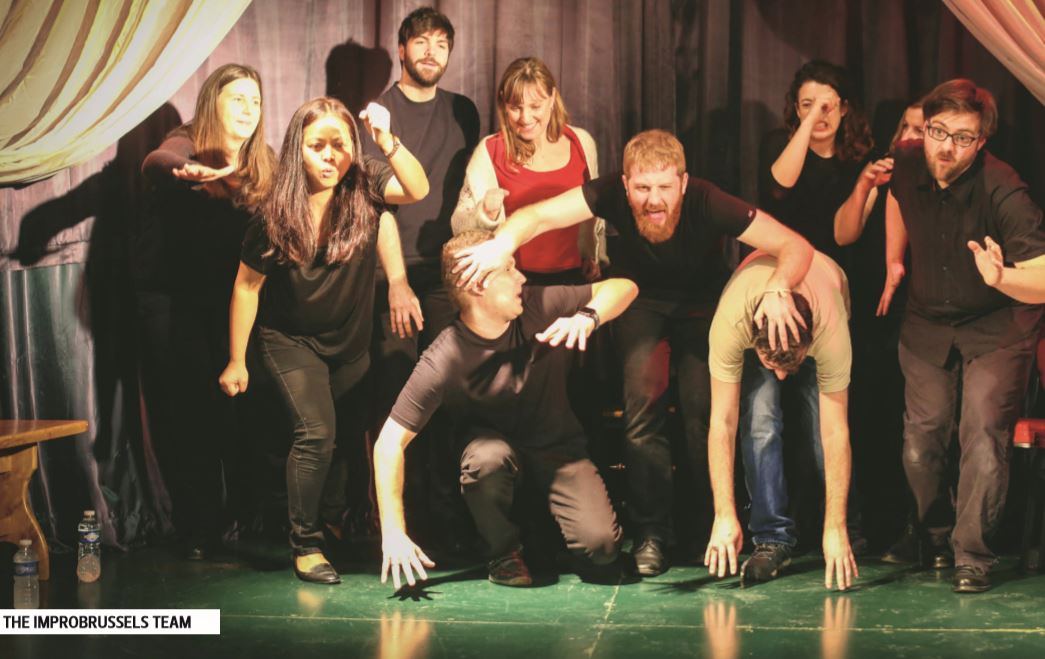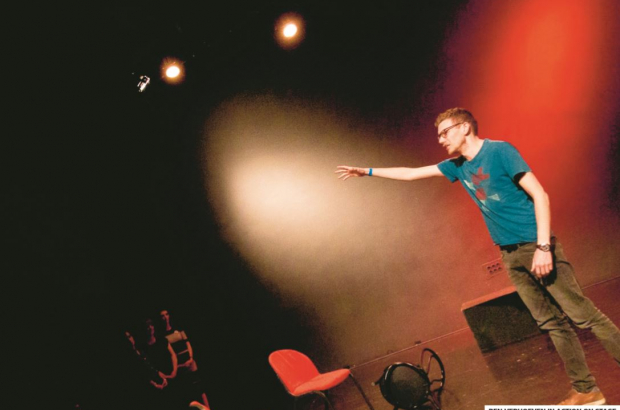- Daily & Weekly newsletters
- Buy & download The Bulletin
- Comment on our articles
Just say yes: How improv can change your life
Imagine you’re standing on stage, surrounded by strangers. Everyone’s watching, waiting for your next line, and you have only your imagination to call on. Sounds excruciating, doesn’t it? Nevertheless, every week in Belgium, hundreds of people are choosing to undergo what many of us might consider torture and doing exactly this, in one of a growing number of improvisation classes.
While improvisational theatre has a long history as a performance art – from Ancient Rome to contemporary comedians Steve Carell and Tina Fey – it’s now moved out of the entertainment industry and reached the mainstream. Improv classes are booming: non-performers are signing up for all sorts of reasons, and the corporate world has discovered the benefits of the craft too, booking improv teachers for team-building exercises and to strengthen employees’ soft skills.
After taking the likes of London and New York by storm, where fans of the genre can attend improv shows every day and there’s a huge choice of schools and classes, the trend of unscripted, spontaneous performing has caught on in Belgium, too. Brussels, Antwerp, Ghent and Leuven all have their own initiatives, and they’re increasingly well-connected, teaming up for festivals or for the recent first edition of the English-language ImproBrussels Day.

“We’re now arriving at a state I’d call the professionalisation of the Belgian improv scene,” says Italian Nicola Dotti, the founder of the Brusselsbased Impro for Dummies project, which gathers 40 people from 27 countries and had to double its course offer this year in response to the growing demand. What for many started as a hobby is turning into a thriving enterprise.
That’s the case for Kelly Agathos, a member of improv troupe The Ghost Sheep and founder of ImproBubble, a school in Brussels offering various levels of improv courses as well as a performance programme and masterclasses taught by internationally renowned figures of the genre. Why has the movement caught on? “It’s hard to say. I think it’s so attractive because you’re learning so many things without even noticing. Plus, it’s just lots of fun,” she says, adding: “It’s scientifically proven that people learn best through play, and improv has so many hidden advantages.”

Ben Verhoeven, founder of Swaajp, an improv theatre project in Antwerp, makes the case that the principles of improv are useful not only on stage but also in the private sphere. “I’d call it a way of life,” he says. Agathos agrees: “It really changes you as a person.” Part of these principles is the “Yes, and…” rule, considered the foundation of all improv.
“A story can only evolve if you accept what your partner has said and try to build on it,” Verhoeven explains. “You can translate this into ‘saying yes to life’ and the opportunities it brings.” Accordingly, collaboration, empathy, active listening and team spirit are skills that are highly valued and consistently strengthened when doing improv.
Istvan Laurinyecz, an in-house trainer at the European Parliament, started taking beginner-level improv classes at Brussels’ ImproBubble last October and is already reaping the benefits. Laurinyecz, from Hungary, had no previous theatre experience, and appears almost surprised by how much the new hobby has improved his life.
“Originally, I just wanted to try something new and meet new people,” he says, adding: “I really like that it pushes you past your comfort zone. You get to know yourself better. It’s proved useful for my job as well: I’m much more relaxed speaking in front of groups and it’s really taken the pressure off. Plus, I’m less judgmental, and I pay more attention to other people’s ideas.” In just a few months, he’s fallen in love with the art form so much that he booked an intensive summer course in London. “Although it’s not always easy, there’s always a lot of laughter and I find it energising,” he says.
Despite what you might think, you don’t need to be a born performer to take pleasure in improv. The opposite is true, according to Dotti. “If you want to show off and demonstrate how funny you are, this isn’t the right place for you,” she says. Instead, qualities such as cooperation and stepping in to help others are greatly encouraged. You don’t need to be a natural comic, either, because improv isn’t only about comedy. “I prefer the narrative and dramatic side of it, which is an aspect we’re trying to nurture with Swaajp,” says Verhoeven. “Improv can touch on serious topics and make people think.”
'We're all in the same boat'
While it might seem intimidating to some, Agathos insists the environment is a welcoming one. “The classes provide a safe space,” she says. “We’re all in the same boat.” Verhoeven agrees, saying that one of the first concepts he teaches in a beginner class is trust. All teachers emphasise that improv really is for everyone, not just the confident and quick-witted. “There are absolutely no skills necessary,” Agathos says. “You just need to come with an open mind and allow yourself to be vulnerable.”
People who are shy and short on self-confidence can profit immensely from improv. “For me, the biggest satisfaction is seeing the introverted students come out of their shells and enjoy themselves on stage,” says Dotti. And as Laurinyecz puts it: “If you’re scared, you should try it.”


















